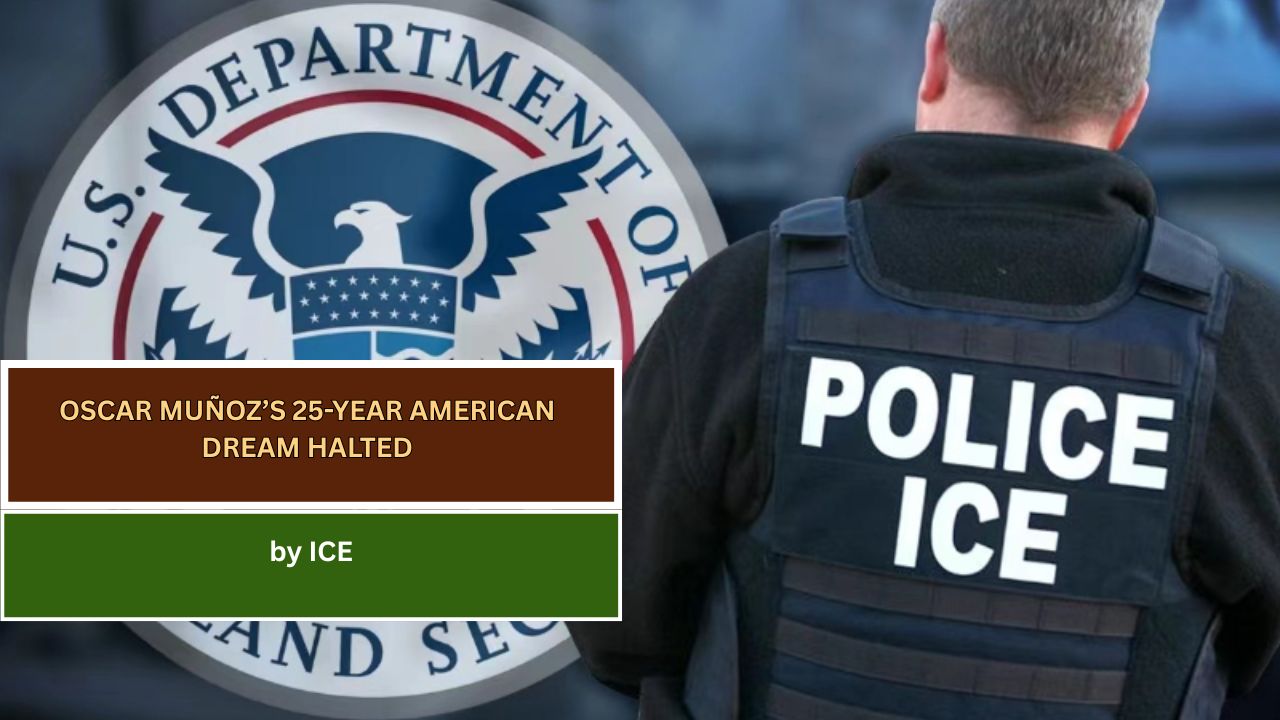Oscar Muñoz came to the U.S. at 14 with little certainty of what lay ahead. Twenty-five years later, after building a family and a popular business, he now faces deportation — and the potential collapse of everything he’s worked for.
“There are people who didn’t rob anything, and they (ICE) grabbed them at the front border, and now they’re here,” Muñoz said in a phone interview from the Moshannon Valley Processing Center, a privately-run ICE detention facility in Philipsburg, Pennsylvania.
“I’ve built everything here; it’s been 25 years!” said Muñoz, who immigrated from Puebla, a city in central Mexico.
He owns Taco Drive in Jersey City, N.J., where the aroma of sizzling tacos, the vibrant Jarritos bottles, and an upside-down Statue of Liberty greet customers. He’s also the father of two children, both born in the U.S.
Now, Muñoz sits nearly four and a half hours away from his family, detained by ICE under policies that have become increasingly aggressive under Trump’s second term. Speaking with Slice of Culture, Muñoz recounted his time at the facility, which began after an arrest by Hoboken police.
Following a brief stay at a local detention center, he was transferred to Moshannon Valley. “They charge me even for the air I breathe!” he exclaimed, describing limited access to hygiene products like toothpaste and deodorant. Despite those hardships, he finds small comfort in cooking meals with fellow detainees. “We all share a kitchen together and we rotate, so I’ll make them a burrito or a taco. Obviously not the way at the restaurant, but still they like it.”
Muñoz said he’s been held at Moshannon for nearly a year with no access to parole. When Slice of Culture attempted to visit him, facility officials denied entry, citing that reporters had taken photographs in the parking lot.
Each year, around 40,000 immigrants are detained across the U.S. ICE reported arresting an average of 872 immigrants per day in late January and about 600 daily in early February.
Fourteen of the nation’s 20 largest immigration detention centers are located in Mississippi, Louisiana, and Texas, according to TRAC immigration data. Moshannon Valley, once a federal prison, reopened in 2021 as an ICE facility with a capacity of 1,876 beds. It’s now one of the largest detention centers in the Northeast and is managed by GEO Group, a private company contracted by the federal government to run more than a dozen such centers nationwide.
A report by students at Temple University’s Beasley School of Law and Philadelphia-based Juntos found that detainees at Moshannon were being “held under punitive, inhumane and dangerous conditions.” The report included interviews with 77 immigrants housed there.
According to a Congressional Budget Office report reviewed by Slice of Culture, the Department of Homeland Security’s detention operations budget has risen to $9.3 million this year, up from $8.7 million in 2023.
“Oscar was released as far as the state was concerned, but immigration was there to take him into custody,” said Gregory Jachts, the attorney representing Muñoz in his criminal case.
ICE frequently assumes custody of immigrants upon release from local jails, even when criminal charges are pending. This trend gained traction during Trump’s first administration and has intensified during his second.
Court records show Muñoz was previously charged with burglary, trespassing, and criminal mischief for property damage while intoxicated in 2023. A judge dismissed the burglary and trespassing charges in March. Muñoz later accepted a plea deal for the criminal mischief charge and is scheduled for sentencing on April 25.
Jachts argued that cases like Muñoz’s—minor offenses resulting in prolonged federal detention—are increasingly common under ICE’s expanded enforcement.
ICE data reveals that 579,000 immigrants were deported in 2023, including removals under Title 42 and other legal categories. While exact Title 42 figures for 2024 remain unclear, between 2020 and 2023, nearly 3 million individuals were deported from the U.S.-Mexico border.
Trump’s renewed focus on mass deportation has escalated ICE operations. Around 37,660 immigrants were deported in a single month during his second term, according to PBS, with more than a quarter of America’s 51 million foreign-born residents living under legal or procedural protection from deportation, based on Migration Policy Institute data.
Though ICE claims to prioritize immigrants charged with violent crimes, fewer than half of the 8,200 individuals arrested between Jan. 20 and Feb. 2 had criminal charges.
TRAC data shows that 47,928 immigrants were in ICE custody as of April 6, with 46%—or 22,046—having no criminal record at all.
Trump’s 2017 “zero-tolerance” immigration policy tore apart families, with some children as young as four months separated from their parents. That approach continues to ripple through households today.
In New Jersey, approximately 2.25 million immigrants lived in 2023, including about 450,000 undocumented individuals, according to state data.
“We are a nation of immigrants, and we follow due process,” said Jersey City Councilman Yousef Saleh, the son of Palestinian immigrants and a proud Heights native. “When it comes to violent criminals the federal government has every right to use everything in their power to effectuate an arrest, but the 287(g) program incentivizes states to essentially have a bounty program for immigrants.”
This program allows local law enforcement to collaborate with ICE to detain undocumented immigrants. While 38 states have opted in, New Jersey law prohibits participation.
Recently, the federal government added hundreds of thousands of new immigration arrest warrants to the National Crime Information Center (NCIC) database used by local law enforcement—raising the risk of ICE custody without a judge’s order, as reported by NPR.
Councilman Saleh supports stronger legal protections for immigrants and is advocating legislation after Jersey City passed the “Golden Door of America” resolution, symbolizing its proximity to the Statue of Liberty. Fellow Councilman Frank Gilmore has also submitted a letter to Moshannon Valley Processing Center urging Muñoz’s release.
In 2018, New Jersey implemented the Immigrant Trust Directive, limiting how local police can assist ICE.
Muñoz’s 18-year-old daughter, Niomy, who was recently accepted to Columbia University’s engineering program, said she tried to visit her father but was turned away for not having a REAL ID.
In December, she sent a heartfelt letter to the judge overseeing her father’s case. “I respectfully urge you to consider the impact my father’s detention has had on my brother and to allow him the opportunity to stay in the United States,” she wrote. “Oscar is not only a great father but also a person who has so much to contribute to this community. His release would bring boundless relief and joy to my family and would allow him to continue being the role model and support system that my brother and I depend on.”
This article has been carefully fact-checked by our editorial team to ensure accuracy and eliminate any misleading information. We are committed to maintaining the highest standards of integrity in our content.

Outside of work, he enjoys playing chess, following cricket, and writing short stories. His commitment to integrity and in-depth analysis strengthens OTE News’ mission of providing trustworthy journalism.



